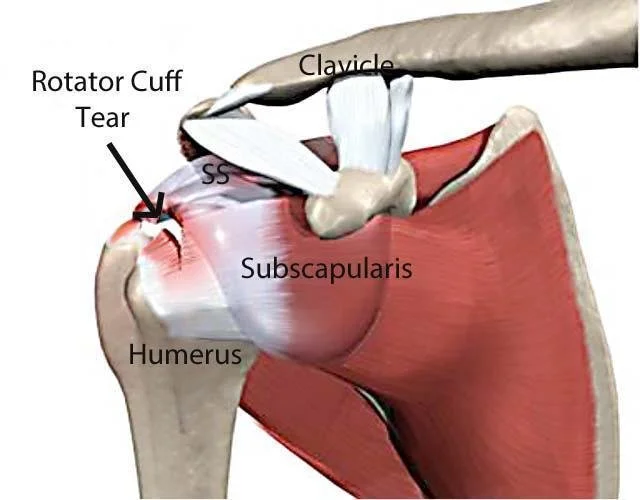Do I Need Surgery for a Torn Rotator Cuff?
A torn rotator cuff can be painful, frustrating, and disruptive — but it doesn’t always mean you need surgery. Whether you’re an athlete, weekend warrior, or just struggling with shoulder pain, here’s what you need to know about when surgery is necessary, and when it’s not.
What Is a Rotator Cuff Tear?
The rotator cuff is a group of four muscles and tendons that stabilise your shoulder joint. Tears can be:
• Partial: Fraying or minor tearing of the tendon
• Full-thickness: A complete tear through the tendon
Rotator Cuff Tear
They’re typically caused by:
• Repetitive overhead movements (e.g., throwing, lifting)
• Trauma (falls, heavy lifting)
• Degenerative changes with age
When Surgery Might Be Necessary
Surgery is more likely required if:
• You have a full-thickness tear
• The tear causes significant weakness or loss of function
• There’s tendon retraction or multiple tendons involved
• You’re younger, athletic, or physically active
• You’ve had no improvement after 3–6 months of targeted rehab
Surgical repair involves reattaching the torn tendon to the bone, usually via arthroscopy (keyhole surgery).
When You Can Avoid Surgery
Not all rotator cuff tears require an operation. In fact, many people recover functionally without it, especially if:
• The tear is partial
• You still have good range of motion and strength
• Your pain is manageable
• You’re older or don’t have high physical demands
• You’re committed to a structured rehab plan
Conservative Treatment That Works
Non-surgical management focuses on:
• Progressive loading of the rotator cuff
• Scapular stabilisation and posture correction
• Hands-on therapy for surrounding soft tissue
• Pain modulation strategies (modalities, dry needling, if appropriate)
At Poseidon Performance, our approach combines clinical rehab with real-world strength and conditioning principles — bridging the gap between treatment and full recovery.
What If You Delay Surgery?
In some cases, delaying surgery too long (especially with large tears) can lead to:
• Muscle atrophy and fatty infiltration
• Irreversible tendon retraction
• Reduced surgical success rates
Key takeaway: early rehab is vital — whether you’re avoiding surgery or preparing for it.
Real Talk: So, Do You Need Surgery?
Probably not — if:
• You can still lift your arm
• The tear is partial
• You’re improving with rehab
Probably yes — if:
• You can’t raise your arm or sleep on your shoulder
• You’ve lost strength or range of motion
• Rehab hasn’t helped after months
Rotator Cuff Injury FAQ
How long does rotator cuff rehab take without surgery?
Most clients see noticeable improvements within 8–12 weeks of structured rehab. Full recovery — especially for strength and resilience — can take 3–6 months, depending on the tear’s severity and consistency with training.
Can I train upper body with a torn rotator cuff?
Yes — but it needs to be strategic and supervised. Avoid overhead pressing or heavy pulling early on. Instead, focus on scapular stability, isometric loading, and controlled horizontal patterns. A coach or rehab specialist can guide safe progressions.
Does a cortisone injection help?
Cortisone can reduce inflammation and pain in the short term, especially if pain is limiting rehab. However, it’s not a cure and shouldn’t be used as a substitute for movement-based recovery.
Can a rotator cuff tear heal on its own?
Partial tears often improve significantly with rehab, though they don’t “heal” like a cut. Full-thickness tears won’t reattach naturally, but many people regain full function without surgery.
Is it dangerous to delay surgery?
If the tear is large, retracted, or worsening, delaying surgery too long can make the repair harder or even impossible. But in most cases, a trial of conservative treatment is safe — and often successful.
Want Expert Eyes on Your Shoulder?
If you’re not sure what to do next, we offer:
• In-depth assessment of your shoulder
• Tailored rehab plans specific to your needs
• Return-to-performance strategies, not just pain relief
Book a consult at Poseidon Performance — online or in-person — and get clarity, direction, and a plan.

